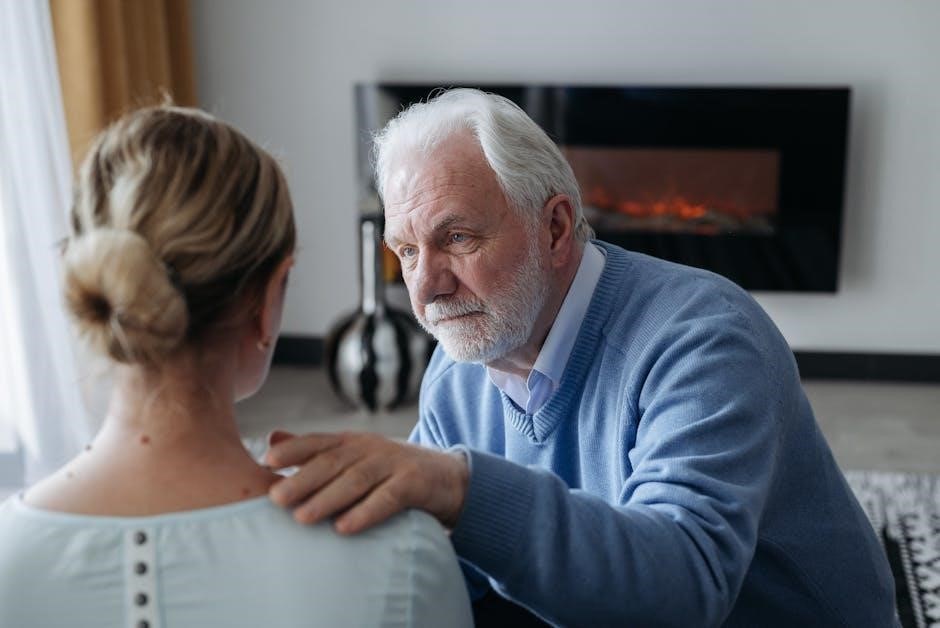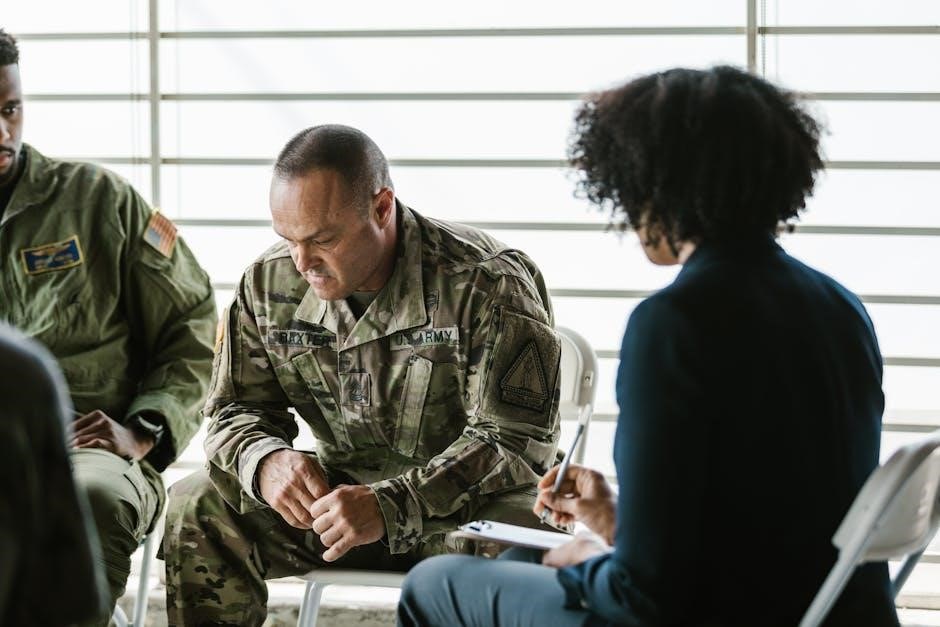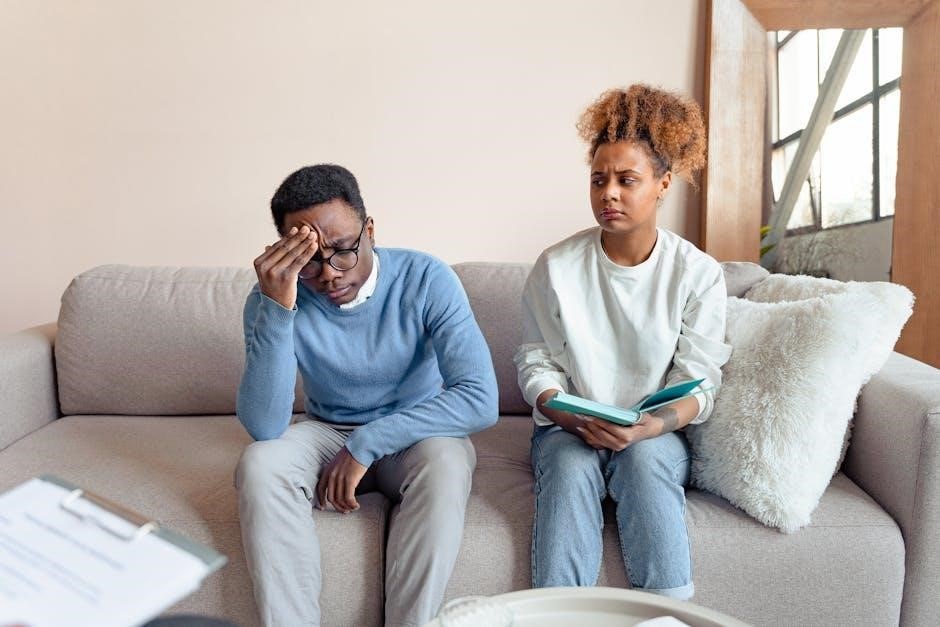Welcome to the world of couples counseling, where a guided journey approach helps partners navigate relationship challenges. This structured method fosters communication, understanding, and mutual growth, ensuring both individuals feel heard and supported throughout the process. By addressing core issues and fostering empathy, couples counseling near you can strengthen your bond and pave the way for a healthier, more fulfilling relationship.
1.1 Understanding the Concept of Couples Counseling
Couples counseling is a collaborative process where partners work with a trained therapist to address relationship challenges. It focuses on improving communication, resolving conflicts, and strengthening emotional bonds. The guided journey approach emphasizes creating a safe space for open dialogue and mutual understanding. Techniques like the Paper Exercise, adapted from Susan Campbell’s work, encourage honest expression and empathy, helping couples navigate their unique dynamics and foster lasting connection.
1.2 The Role of a Guided Journey in Counseling
A guided journey in counseling serves as a structured approach to navigating relationship challenges. It emphasizes active participation from the therapist, who facilitates open dialogue and challenges harmful thought patterns. This method ensures couples address core issues, fostering growth and understanding. Tools like the Paper Exercise, adapted from Susan Campbell’s work, encourage honest communication, helping couples rebuild trust and strengthen their emotional connection through a supportive, goal-oriented process.

Benefits of Couples Counseling
Couples counseling enhances communication, resolves conflicts, and strengthens emotional bonds. It fosters trust, understanding, and intimacy, helping partners navigate challenges and build a resilient, fulfilling relationship together.
2.1 Improved Communication and Conflict Resolution
Couples counseling significantly enhances communication by teaching active listening and empathy. It equips partners with tools to express feelings constructively and address conflicts without escalation. Through guided exercises, such as the Paper Exercise, couples learn to articulate needs clearly and resolve disagreements collaboratively, fostering a healthier and more understanding relationship dynamic.
2.2 Rebuilding Trust and Strengthening Emotional Bonds
Couples counseling helps rebuild trust by addressing past hurts and fostering accountability. Through guided exercises and open dialogue, partners learn to express vulnerability and empathy, strengthening emotional connections. Active efforts to understand each other’s needs create a safer, more intimate relationship, allowing trust to flourish and emotional bonds to deepen over time.
Signs That Indicate the Need for Couples Counseling
Persistent conflict, emotional distance, or a lack of intimacy often signal the need for couples counseling. When communication breaks down or trust erodes, seeking professional guidance becomes essential to address these challenges and work toward a healthier relationship dynamic.
3.1 Persistent Conflict and Misunderstandings
Persistent conflict and recurring misunderstandings are key indicators that couples counseling is necessary. When disagreements consistently escalate without resolution, it reflects deeper issues such as communication gaps or unmet emotional needs. Over time, these unresolved conflicts can lead to resentment and emotional distance, making it harder to reconnect. Addressing these issues early through guided counseling can prevent further deterioration and restore harmony in the relationship.
3.2 Emotional Distance or Lack of Intimacy
Emotional distance and a lack of intimacy are red flags for couples, signaling the need for counseling. When partners feel disconnected emotionally or physically, it can lead to isolation and dissatisfaction. Guided counseling helps bridge this gap by fostering open dialogue and reigniting emotional bonds, assisting couples in reconnecting on a deeper level and strengthening their relationship.

How to Prepare for Your First Couples Counseling Session
Reflect on your goals and concerns beforehand. Practice open communication and active listening. Be ready to share honestly, fostering a collaborative environment guided by your therapist.
4.1 Identifying Key Issues to Discuss
Before your first session, reflect on specific challenges, such as communication problems or trust issues. Consider financial disagreements, intimacy concerns, or parenting differences. Note patterns in past arguments and unmet emotional needs. This clarity helps focus the session on core concerns, ensuring productive dialogue and progress. Writing down key points can also serve as a guide during therapy, fostering a structured approach to addressing relationship dynamics.
4.2 Setting Realistic Expectations for Therapy
Therapy is not a quick fix but a gradual process requiring commitment. Understand that progress takes time and active participation from both partners. Be prepared for challenging conversations and emotional moments. Setting realistic goals, like improving communication or rebuilding trust, helps track progress. Remember, therapy is a safe space to explore issues, and patience with the process is essential for meaningful change and growth in your relationship.
Choosing the Right Couples Therapist for Your Needs
Selecting the right therapist is crucial. Look for qualifications, a compatible approach, and a safe environment to address relationship challenges effectively.
5.1 Qualifications and Specializations to Look For
When selecting a couples therapist, seek a licensed professional with expertise in relationship dynamics. Look for certifications in evidence-based methods like EFT or Gottman therapy. Experience in addressing issues like communication, trust, and conflict resolution is essential. Ensure the therapist has a track record of helping couples with concerns similar to yours. A non-judgmental, empathetic approach and active participation in sessions are key to fostering progress.
5.2 The Importance of Compatibility with Your Therapist
Compatibility with your therapist is crucial for effective couples counseling. Ensure their approach aligns with your needs and communication style. A therapist who understands your dynamic and fosters a safe, non-judgmental space can enhance trust and openness. Compatibility also means they actively guide discussions, helping you both feel heard and supported. A strong therapeutic connection ensures personalized attention and tailored strategies to address your unique challenges and goals.

Common Issues Addressed in Couples Counseling
Couples counseling addresses issues like financial disagreements, parenting styles, communication breakdowns, trust issues, intimacy challenges, and recurring conflicts. These sessions help partners navigate misunderstandings and foster emotional resilience.
6.1 Navigating Financial Disagreements
Financial disagreements are a common challenge in relationships, often stemming from differing spending habits or financial priorities. Couples counseling helps identify these patterns, fostering open dialogue and collaboration. Therapists guide couples in creating practical budgets, addressing money-related stress, and aligning financial goals. By fostering understanding and compromise, counseling empowers partners to manage finances cooperatively, reducing conflict and strengthening their emotional and financial partnership.
6.2 Managing Differences in Parenting Styles
Differences in parenting styles can create tension, especially when partners have conflicting approaches to raising children. Couples counseling helps bridge these gaps by fostering open discussions about values, expectations, and parenting strategies. Through guided exercises, therapists assist couples in aligning their goals, improving communication, and developing a unified approach to parenting. This collaborative process strengthens the partnership and creates a more cohesive, supportive family environment for children to thrive.

The Role of the Therapist in Guided Journey Counseling
The therapist acts as a guide, facilitating open dialogue and actively intervening to prevent harm. They create a safe space for exploration and growth, helping couples navigate conflicts and strengthen their relationship through structured techniques and supportive interventions. Their active involvement ensures progress and fosters a collaborative environment for healing and connection.
7.1 Facilitating Open and Honest Dialogue
In guided journey counseling, the therapist creates a safe space for both partners to express themselves freely. By actively listening and using reflective techniques, they help couples articulate emotions and concerns clearly. The therapist ensures each voice is heard, fostering an environment of mutual understanding and respect. This open dialogue is crucial for addressing issues and building a stronger connection, guided by the therapist’s expertise in communication strategies.
7.2 Intervening When Necessary to Prevent Harm
In guided journey counseling, the therapist actively intervenes to prevent emotional harm or destructive patterns. By challenging unhealthy communication and addressing toxic behaviors, the therapist ensures a safe and constructive environment. This proactive approach helps couples avoid further damage to their relationship, fostering a space where both partners can grow and heal together. Timely interventions are key to promoting positive interactions and lasting change.
Tools and Exercises Used in Couples Counseling
Couples counseling utilizes tools like The Paper Exercise and science-based exercises to foster healthy communication and relationship growth. These structured activities help partners address conflicts and strengthen bonds effectively.
8.1 The Paper Exercise: A Practical Tool for Communication
The Paper Exercise, adapted from Susan Campbell’s work, is a simple yet powerful tool for couples. Each partner writes their thoughts and feelings, fostering non-verbal communication. This exercise encourages honesty, clarity, and active listening, helping couples address conflicts without defensiveness. It’s a structured approach to deepen understanding and empathy, making it easier to navigate challenging conversations and strengthen the relationship.
8.2 Science-Based Exercises for Building Healthy Relationships
Science-based exercises in couples counseling are designed to foster healthy communication and emotional connection. These activities, rooted in research, help partners practice active listening, empathy, and constructive dialogue. By engaging in exercises like gratitude practices or shared goal-setting, couples can strengthen their bond and develop patterns of interaction that promote intimacy and understanding. These tools empower relationships to grow and thrive over time.
Success Stories and Case Studies
Real-life examples highlight how couples counseling transformed relationships. Partners who once faced discord now enjoy harmony, showcasing the positive impact of guided journey counseling on their lives.
9.1 Real-Life Examples of Couples Who Benefited from Counseling
Couples who engaged in guided journey counseling often reported significant improvements. For instance, Sarah and Mike resolved their financial disagreements through structured exercises, while Emily and James rebuilt trust after infidelity. These real-life examples demonstrate how counseling helped partners reconnect, fostering understanding and renewed commitment. The practical tools provided during therapy empowered them to navigate challenges effectively, leading to stronger, healthier relationships.
9.2 Overcoming Specific Challenges Through Therapy
Guided journey counseling has proven effective in addressing unique challenges, such as financial disputes and communication breakdowns. Couples learned to navigate disagreements through structured exercises like the Paper Exercise, fostering clarity and understanding. Therapy also helped rebuild trust and reignite intimacy, enabling partners to address root causes of conflict. By tackling specific issues head-on, couples achieved lasting resolutions and strengthened their emotional bonds, leading to more harmonious relationships.
Setting Boundaries in Couples Therapy
Setting boundaries ensures confidentiality, respect, and a safe environment. These limits protect both partners and the therapeutic relationship, fostering trust and openness.
10.1 Establishing Healthy Limits in the Therapeutic Relationship
Healthy boundaries in therapy ensure a safe, respectful space for both partners. This includes clear guidelines on communication, confidentiality, and emotional expression. Therapists play a key role in setting these limits, ensuring sessions remain productive and focused on growth. By establishing these boundaries, couples can navigate challenges without fear of judgment or emotional overload, fostering trust and progress in their relationship journey.
10.2 The Importance of Confidentiality and Respect
Confidentiality and respect form the cornerstone of effective couples counseling. Therapists must maintain strict confidentiality to build trust, ensuring each partner feels secure sharing personal thoughts. Mutual respect between the therapist and couple fosters an environment where open dialogue thrives, free from judgment. This foundation allows couples to address sensitive issues honestly, promoting healing and understanding in their relationship journey.
Cost and Insurance Considerations for Couples Counseling
Understanding the financial aspects of therapy is crucial. Checking if your insurance covers couples counseling ensures transparency and helps avoid unexpected costs, making therapy more accessible.
11.1 Understanding the Financial Aspects of Therapy
Exploring the financial aspects of therapy involves assessing session costs, insurance coverage, and payment options. Many therapists offer sliding scale fees based on income, making counseling accessible; It’s important to inquire about these details during the initial consultation to ensure transparency and avoid financial surprises. Understanding these factors helps couples budget effectively for their therapeutic journey.
11.2 How to Check if Your Insurance Covers Couples Counseling
To verify if your insurance covers couples counseling, contact your provider directly. Ask about policy specifics, such as coverage for relationship therapy and any applicable copays or deductibles. Check if your therapist is in-network, as this impacts reimbursement. Understanding your insurance benefits ensures financial clarity and helps you make informed decisions about your guided journey counseling experience.



